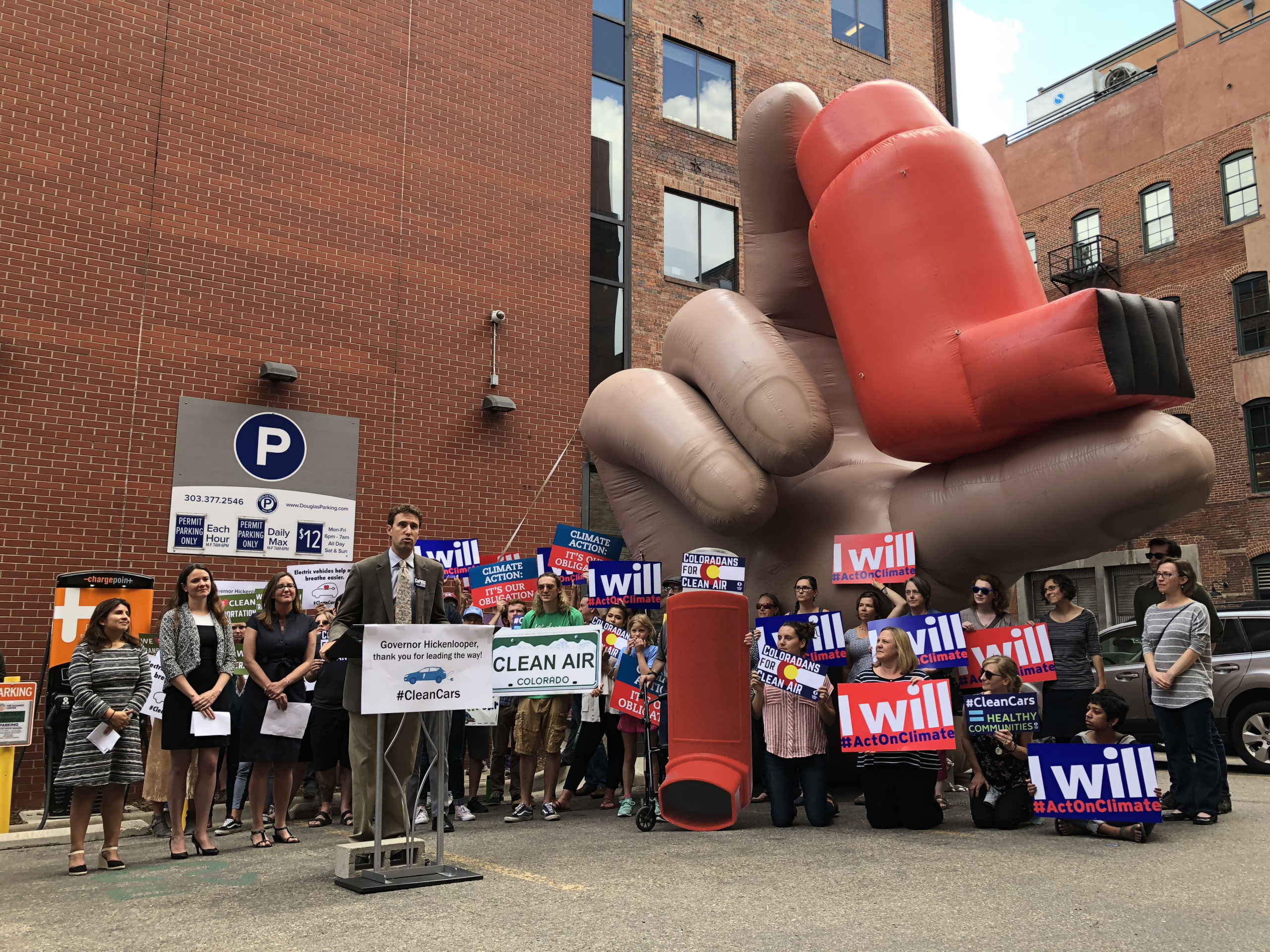Danny Katz
Executive Director, CoPIRG
Executive Director, CoPIRG
This morning, Colorado Governor John Hickenlooper signed an executive order to begin the process to adopt advanced clean car standards in Colorado. His action comes as the Trump administration moves to rollback federal clean car rules that have been in place for years.
CoPIRG joined with leaders from environmental, consumer, health and business groups to highlight that adopting advanced clean car standards in Colorado would provide strong safeguards from air pollution caused by gasoline and diesel vehicles, cut greenhouse gas emissions and save Coloradans money at the pump.

By initiating this public rulemaking process, Colorado could join 13 other states and the District of Columbia as leaders in clean car technology and clean air.
“Inefficient cars are just wasteful – they cost consumers every time we go to the pump and they hurt our health when they produce unnecessary pollution,” said Danny Katz, director of CoPIRG. “Clean car standards result in more fuel efficient and cleaner vehicles, which benefit our wallets and our personal health. As technology advances, we need to take advantage of even cleaner, more fuel efficient cars. That’s why we applaud Governor Hickenlooper’s action to make Colorado a leader around fuel efficient, cleaner cars.”
CoPIRG was joined in applauding the Governor’s executive order by Elizabeth Babcock from Denver’s Department of Public Health and the Environment (DDPHE), which recently released a report with public health officials in Boulder and Jefferson County on the health and economic benefits of adopting the Advanced Clean Car Standards.
According to the report, Denver was ranked the 11th most polluted city in the nation for ozone levels, and vehicle emissions are one of the largest contributors. Adopting the advanced standards will not only protect Coloradans from illness, but it will save money. According to the report, with the clean car standards in place, by 2040 Colorado would save roughly $16 to $37 million in health care costs; reduce the number of work days lost due to illness from air pollutant emissions; and save $260 million per year in social costs from long-term damage caused by carbon dioxide (CO2) emissions.
“Denver Department of Public Health & Environment is excited to see Colorado moving forward with clean car standards to ensure we have clean air to breathe, as children only have one chance to grow healthy lungs,” said Elizabeth Babcock, Manager for Air, Water, for DDPHE. “Low emission vehicle standards protect public health by reducing harmful vehicle emissions that generate air pollution and exacerbate climate change.”
In the Denver area, emissions of smog-causing air pollutants from vehicles is set to increase by about 15 percent if the federal standards are rolled back. For Coloradans, especially the 343,000 people who are living with asthma, more air pollution means more coughing and wheezing, increased risk of infection, and permanent damage to lung tissue.
In addition to reducing pollution, clean car standards help ensure Coloradans are not wasting money at the pump. According to the Union of Concerned Scientists, based on the federal clean car standard, the average Colorado household would see $2,700 in savings by 2030 from lower gas bills, even if you factor in a higher up front price for a vehicle and Coloradans as a whole have already saved $550 million. Adopting Colorado clean car standards would keep Colorado on track for these savings even if the Trump Administration is successful in rolling back the national rules.
Thirteen states (California, Connecticut, Delaware, Maine, Maryland, Massachusetts, New Jersey, New York, Oregon, Pennsylvania, Rhode Island, Vermont, and Washington) and the District of Columbia have adopted a set of state clean car standards designed to reduce the emission of smog-forming pollutants, particulate matter, and carbon pollution and to support the development of zero-emission vehicle technology.
The Trump administration’s action to weaken the federal clean car standards comes despite reviews by the EPA in January 2017 and the state of California in March 2017 that concluded the standards remain appropriate. In addition, automakers are developing and deploying fuel efficient technologies at a faster rate and with lower compliance costs than projected.
Governor Hickenlooper’s executive order puts Colorado on the path to join these states by initiating a public process with the Air Quality Control Commission (AQCC). The first step is the Colorado Department of Public Health and Environment will do an analysis and present a draft rule to the AQCC by August. Industry, organizations, and interested parties will have a chance to provide feedback as well as the public in the fall. The AQCC will consider the adoption of the new rule in December, which could be effective in 2019.